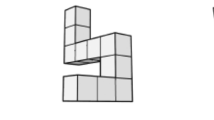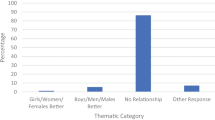Abstract
The objective of this study was to explore, using Q-methodology, women's subjective reactions to and experiences with mathematics. Ninety-six undergraduate women from a private university conducted Q-sorts on items that related to their personal experiences, attitudes, and belief/awareness of gender stereotypes for math. On the basis of the Q-factor analysis, three unique perspectives toward math emerged. The perspectives were classified as “Successfully Encouraged,” “Stereotypically Discouraged,” and “Mathematically Aversive.” These groupings were differentiated by their variety of experiences, attitudes, and awareness of stereotypes about math. Measures of math self-schema, math anxiety, and self-reported math ability were also used to interpret the groupings. This research revealed the women's various experiences with and attitudes toward math. The findings are integrated with previous theories in order to understand women's underrepresentation in math-related fields.
Similar content being viewed by others
References
Betz, N. (1978). Prevalence, distribution, and correlates of math anxiety in college students. Journal of Counseling Psychology, 25, 441-448.
Betz, N., & Hackett, G. (1983). The relationship of math self-efficacy expectations to the selection of science-based college majors. Journal of Vocational Behavior, 23, 329-345.
Chipman, S., Krantz, D., & Silver, R. (1992). Math anxiety and science careers among able college women. Psychological Science, 3, 292-295.
Eccles, J. S. (1987). Gender roles and women's achievement-related decisions. Psychology of Women Quarterly, 11, 135-172.
Eccles, J. S. (1994). Understanding women's educational and occupational choices: Applying the Eccles et al. model of achievement-related choices. Psychology of Women Quarterly, 18, 585-609.
Eccles, J., Barber, B., & Jozefowicz, D. (1999). Linking gender to educational, occupational, and recreational choices: Applying the Eccles et al. model of achievement-related choices. In W. Swann & J. Langlois (Eds.), Sexism and stereotypes in modern society: The gender sciences of Janet Taylor Spence (pp. 153-192). Washington, DC: American Psychological Association.
Eccles, J., Jacobs, J., & Harold, R. (1990). Gender role stereotypes, expectancy effects, and parents' socialization of gender differences. Journal of Social Issues, 46, 183-201.
Frome, P., & Eccles, J. (1998). Parents' influence on children's achievement-related perceptions. Journal of Personality and Social Psychology, 74, 435-452.
Hyde, J., Fennema, E., & Lamon, S. (1990). Gender differences in math performance: A meta-analysis. Psychological Bulletin, 107, 139-155.
Hyde, J. S., Fennema, E., Ryan, M., Frost, L., & Hopp, C. (1990). Gender comparisons of math attitudes and affect. Psychology of Women Quarterly, 14, 299-324.
Jacobs, J. E., & Eccles, J. S. (1992). The impact of mothers' gender-role stereotypic beliefs on mothers' and children's ability perceptions. Journal of Personality and Social Psychology, 63, 932-944.
Jacklin, C. N., & Baker, L. A. (1993). Early gender development. In S. Oskamp & M. Costanzo (Eds.), Gender issues in contemporary society (pp. 41-57). Washington, DC: American Psychological Association.
Kitzinger, C. (1999). Researching subjectivity and diversity: Q-methodology in feminist psychology. Psychology of Women Quarterly, 23, 267-276.
Kitzinger, C., & Rogers, R. (1985). A Q-methodological study of lesbian identities. European Journal of Social Psychology, 15, 167-187.
Lapan, R., Shaughnessy, P., & Boggs, K. (1996). Efficacy expectations and vocational interests as mediators between sex and choice of math/science college majors: A longitudinal study. Journal of Vocational Behavior, 49, 277-291.
Lubinski, D., & Benbow, C. P. (1992). Gender differences in abilities and preferences among the gifted: Implications for the math-science pipeline. Current Directions is Psychological Science, 1, 61-65.
Mau, W., & Lynn, R. (2000). Gender differences in homework and test scores in mathematics, reading, and science at 10th and 12th grade. Psychology, Evolution, and Gender, 2, 119-125.
McKeown, B., & Thomas, D. (1988). Q-methodology. Beverly Hills, CA: Sage.
Meece, J., Parsons, J., Kaczala, C., Goff, S., & Futterman, R. (1982). Sex differences in math achievement: Toward a model of academic choices. Psychological Bulletin, 91, 324-348.
National Science Foundation. (2000). Women, minorities, and persons with disabilities in science and engineering: 2000 (NSF Publication No. 00–327). Arlington, VA: Author.
Nosek, B., Banaji, M., & Greenwald, A. (2002). Math = male, me = female, therefore math not = me. Journal of Personality and Social Psychology, 83, 44-59.
Senn, C. Y. (1993). Women's multiple perspectives and experiences with pornography. Psychology of Women Quarterly, 17, 319-341.
Snelling, S. J. (1999). Women's perspectives on feminism: A Q-methodological study. Psychology of Women Quarterly, 23, 247-266.
Spencer, S., Steele, C., & Quinn, D. (1999). Stereotype threat and women's math performance. Journal of Experimental Social Psychology, 35, 4-28.
Steele, C., & Aronson, J. (1995). Stereotype threat and the intellectual test performance of African Americans. Journal of Personality and Social Psychology, 69, 797-811.
Yee, D. K., & Eccles, J. S. (1988). Parent perceptions and attributions for children's math achievement. Sex Roles, 19, 317-333.
Author information
Authors and Affiliations
Corresponding author
Rights and permissions
About this article
Cite this article
Oswald, D.L., Harvey, R.D. A Q-Methodological Study of Women's Subjective Perspectives on Mathematics. Sex Roles 49, 133–142 (2003). https://doi.org/10.1023/A:1024456829810
Issue Date:
DOI: https://doi.org/10.1023/A:1024456829810




